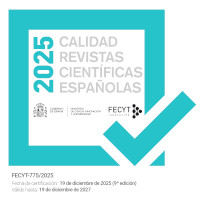MONOGRAPH ON COMMUNICATION TRANSFER: THE FINAL STEP OF RESEARCH
About the monograph:
University based research activity has an ultimate purpose, as recognised by the Spanish Law of Science, which is Knowledge Transfer (KT): return the knowledge generated to society for problem solving and environmental improvement. KT activity has historically been associated with certain areas of knowledge such as engineering or health sciences; and yet, often spontaneously and even unaware, the social sciences also produce valuable transferrable knowledge. This monograph aims to highlight this activity, help categorize it, and raise awareness, acknowledging the KT happening already within communication research.
In complex societies, knowledge transfer is only possible through interdisciplinarity, transversality, and collaboration with professionals and institutions. Of course, this process also involves intergenerational exchange between senior and junior researchers to share the passion and value of a socially committed vocation for science .
Production and science dissemination is a collective task to which all academic disciplines must commit , aiming to provide a round view of reality from diverse perspectives: communication, economics, anthropology, law, marine biology, etc. because splitting science between human science and pure sciences does not acknowledge that humans are a unified entity with nature and that we need to approach problems holistically. Communication is the spearhead to empower the citizenry .
Research activity in communication often impacts on the productive sector, professional activity, and society. This monograph on Communication Knowledge Transfer seeks to highlight the activities taking place in Communication Faculties across Spain and Latin America. Preference will be given to article proposals that emphasize multidisciplinary collaboration between communication researchers and other knowledge areas, with particular attention to initiatives supported by Knowledge Transfer Vice-Rectors, Research Results Knowledge Transfer Offices (OTRIs), cooperation offices, and Science Culture Units (UCCi), or similar entities.
We invite submissions that align with any of the following principles related to knowledge transfer:
✓ Corporate Chairs: as a means of institutional interaction between companies and universities, creating a common space for experience exchange. In communication, these exist in various themes and formats.
✓ Knowledge-Based Companies or Spin-Offs: companies created by university personnel. The most common form of university entrepreneurship, often highly innovative.
✓ 68/83 Contracts: recognized in the Spanish Law of science, these allow researchers to undertake projects for companies, transferring university research expertise to the productive sector.
✓ Patents: the registered form of protecting products generated from knowledge, not limited to universities, though universities are leading entities in annual patent production.
✓ Scientific Dissemination: dissemination projects aim to bring knowledge to society in multiple formats and environments. Each target audience has a distinct dissemination method.
✓ Cooperation Projects: development cooperation projects are another form of transfer to less privileged areas, applying scientific knowledge to improve underdeveloped environments.
Keywords:
Knowledge transfer, communication, science dissemination, social impact, social sciences
Editors :
Mar García-Gordillo (University of Seville). PhD in Journalism from the Faculty of Communication at the University of Seville and Principal Investigator of the Research Group Communication & Social Sciences. She is also Director of the RTVE-University of Seville Chair in Cultural Content and Creativity in the Audiovisual and Digital Sector. She teaches in the Bachelor's in Journalism, the Master's in Institutional and Political Communication, the Master's in Communication and Culture, and the Master's in European Studies. Her research focuses on communication and political journalism with particular attention to international politics, the European Union, journalism quality, and gender studies. She was a member of the PERYBIAN Project research team, which analyzes the impact of local journalism on society by establishing indicators of quality and social impact of local media.
ORCID: https://orcid.org/0000-0002-9367-0366
Email: marggordillo@us.es
Dr. Aingeru Genaut (University of the Basque Country) holds a BA in Journalism from the University of Navarra and a PhD in Information Sciences from the University of the Basque Country. An Associate Professor at the Faculty of Social Sciences and Communication at UPV/EHU, he has taught various courses for over 20 years in both undergraduate and graduate programs. He has participated in half a dozen national research projects and is currently involved in an Erasmus+ international project on media literacy. He has published over twenty articles in academic journals such as EPI, RLCS, EMP, Textual & Visual Media, Ámbitos, Análisi, and Zer. His main research lines focus on new technologies and digital journalism, design, infographics, visual journalism, and data visualization.
ORCID: https://orcid.org/0000-0003-3762-3570
Email: aingeru.genaut@ehu.eus
Dr. Joan Ramon Rodríguez Amat (University of Sheffield). Dr. Joan Ramon Rodriguez-Amat is Senior Lecturer in the School of Journalism, Media and Communication at the University of Sheffield since September 2024. He obtained his PhD in Communication Science at the Universitat Autónoma de Barcelona in 2010 with a dissertation on “The symbolic public sphere and the construction of the national states”. He gained a position as postdoctoral assistant in the Department of Publicistic and Communication Science at the University of Vienna (2011-2015). There, he researched on Culture industries and media governance. In 2015 he packed his family to the United Kingdom to join the team at Sheffield Hallam University and work on communication geographies, digital data, and mediatizations. During that time, he authored around twenty journal articles (Communication Theory, New Media and Society, International Journal of Communication, among others), recently he received a fellowship in digital public sphere to work at the University of Munster 2023/24 (Germany); and has been invited to keynote and for inaugural speeches, and has participated in teaching and research exchanges with more than a dozen of European universities. When asked, he insists that he researches on people talking to each other; but actually his work turns around the misfits between politics, culture, and digital data: sometimes he checks cultural policies; sometimes he maps locations and media practices; and sometimes he challenges hybrid communities; sometimes the three of them. To do this, he likes to creatively mix complex computational methods with radical qualitative approaches.
ORCID: https://orcid.org/0000-0001-8391-3638
Email: mon.rodriguez@sheffield.ac.uk
Submission deadline for articles: March 25, 2025
Publication date of the monograph: June 2025























